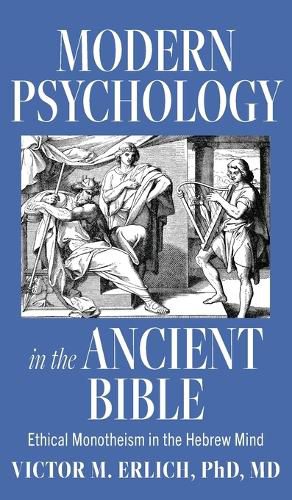Readings Newsletter
Become a Readings Member to make your shopping experience even easier.
Sign in or sign up for free!
You’re not far away from qualifying for FREE standard shipping within Australia
You’ve qualified for FREE standard shipping within Australia
The cart is loading…






This title is printed to order. This book may have been self-published. If so, we cannot guarantee the quality of the content. In the main most books will have gone through the editing process however some may not. We therefore suggest that you be aware of this before ordering this book. If in doubt check either the author or publisher’s details as we are unable to accept any returns unless they are faulty. Please contact us if you have any questions.
The ancient Hebrews particularly needed a psychology that could explain the differences between their beliefs and those of their neighbors. Worshippers of the god Moloch favored child sacrifice, but the Hebrews did not, at least not most of the time. At other times the Hebrews were ambivalent about idolatry, as were those standing before Elijah on Mount Carmel. Too often the stiff-necked Hebrews were drawn into the very depths of irrational idolatry, provoking poetic prophecies of rebuke.
The Hebrews slowly realized that they needed a psychological explanation for their erratic embrace of ethical monotheism, as well as an explanation for the behavior of their irrational neighbors, whom they often admired. What leads one to choose ethical monotheism rather than the rites of Moloch, the fire god?
To answer this question the Hebrew Bible presents a large cast of characters with overactive drives and inadequate reason, from irrational Adam and Eve, fratricidal Cain, and drunk Noah, on through a series of fabled-but-troubled heroes of the Bible, including unpredictable Samson, psychotic Saul, manic David, and Solomon, whom the captivating Queen of Sheba seduced from his wisdom.
This exploration continued into the Bible’s literary work, which includes David’s Psalms, Hosea’s salacious prophecies, Solomon’s erotic Song of Songs, and Jeremiah’s elegiac Lamentations, all of which confront the intra-psychic conflicts described by modern psychology. From beginning to end, the Hebrew Bible follows a psychological thread as it inquires into the kind of mind that might value monotheism.
$9.00 standard shipping within Australia
FREE standard shipping within Australia for orders over $100.00
Express & International shipping calculated at checkout
This title is printed to order. This book may have been self-published. If so, we cannot guarantee the quality of the content. In the main most books will have gone through the editing process however some may not. We therefore suggest that you be aware of this before ordering this book. If in doubt check either the author or publisher’s details as we are unable to accept any returns unless they are faulty. Please contact us if you have any questions.
The ancient Hebrews particularly needed a psychology that could explain the differences between their beliefs and those of their neighbors. Worshippers of the god Moloch favored child sacrifice, but the Hebrews did not, at least not most of the time. At other times the Hebrews were ambivalent about idolatry, as were those standing before Elijah on Mount Carmel. Too often the stiff-necked Hebrews were drawn into the very depths of irrational idolatry, provoking poetic prophecies of rebuke.
The Hebrews slowly realized that they needed a psychological explanation for their erratic embrace of ethical monotheism, as well as an explanation for the behavior of their irrational neighbors, whom they often admired. What leads one to choose ethical monotheism rather than the rites of Moloch, the fire god?
To answer this question the Hebrew Bible presents a large cast of characters with overactive drives and inadequate reason, from irrational Adam and Eve, fratricidal Cain, and drunk Noah, on through a series of fabled-but-troubled heroes of the Bible, including unpredictable Samson, psychotic Saul, manic David, and Solomon, whom the captivating Queen of Sheba seduced from his wisdom.
This exploration continued into the Bible’s literary work, which includes David’s Psalms, Hosea’s salacious prophecies, Solomon’s erotic Song of Songs, and Jeremiah’s elegiac Lamentations, all of which confront the intra-psychic conflicts described by modern psychology. From beginning to end, the Hebrew Bible follows a psychological thread as it inquires into the kind of mind that might value monotheism.